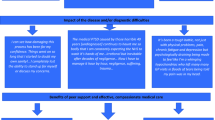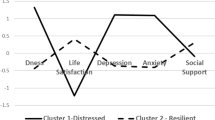Abstract
Purpose
Because symptoms are not immediately visible to others, systemic lupus erythematosus (SLE) is often considered an invisible illness. This invisibility can reduce the social support received from network members and adversely affect the quality of life. In the light of this, social support from formal support groups and from medical professionals can be particularly important; however, literature examining support from these sources is scarce. The purpose of this study was to explore the nature and impact of social support from medical professionals and from support groups for individuals with SLE.
Methods
Participants responded to open-ended questions on an online survey administered by Lupus UK and Lupus Group Ireland. Qualitative data from 133 participants (77 % of respondents) were analysed.
Results
Thematic analysis revealed three overarching themes: invisibility, inadequate care, and validation. Respondents felt that their SLE was invisible to social ties and to medical professionals. In addition, treatment and organisational factors in health care contributed to the sense of inadequate care. Finally, validation was derived from informational and emotional support from both support groups, and from some medical professionals.
Conclusions
The findings suggest that individuals with SLE have mixed experiences in terms of contact with medical professionals and involvement with support groups. Furthermore, low public awareness of lupus appears to contribute to feelings of invisibility for patients, leading to loneliness and isolation. Medical professionals might benefit from skills training in terms of managing the psychosocial consequences of lupus.

Similar content being viewed by others
References
Donoghue, P. J., & Siegel, M. E. (2000). Sick and tired of feeling sick and tired: Living with invisible chronic illness. USA: WW Norton & Company.
Juuso, P., Skär, L., Olsson, M., & Söderberg, S. (2014). Meanings of being received and met by others as experienced by women with fibromyalgia. Qualitative Health Research, 10, 1–10. doi:10.1177/1049732314547540.
Mazzoni, D., & Cicognani, E. (2014). Sharing experiences and social support requests in an Internet forum for patients with systemic lupus erythematosus. Journal of Health Psychology, 1, 689–696.
Moses, N., Wiggers, J., & Nicholas, C. (2008). Persistence of unmet need for care among people with systemic lupus erythematosus: a longitudinal study. Quality of Life Research, 17(6), 867–876.
Cobb, S. (1976). Social support as a moderator of life stress. Psychosomatic Medicine, 38(5), 300–314.
Thoits, P. A. (2011). Mechanisms linking social ties and support to physical and mental health. Journal of Health and Social Behaviour, 52, 145–161.
Cohen, S., & Wills, T. A. (1985). Stress, social support, and the buffering hypothesis. Psychological Bulletin, 98(2), 310–357.
Bae, S. C., Hashimoto, H., Karlson, E. W., Liang, M. H., & Daltroy, L. H. (2001). Variable effects of social support by race, economic status, and disease activity in systemic lupus erythematosus. Journal of Rheumatology, 28, 1245–1251.
Mazzoni, D., & Cicognani, E. (2011). Social support and health in patients with systemic lupus erythematosus: A literature review. Lupus, 20, 1117–1125.
Street, R. L., Jr, Makoul, G., Arora, N. K., & Epstein, R. M. (2009). How does communication heal? Pathways linking clinician–patient communication to health outcomes. Patient Education and Counselling, 74, 295–301.
Corcoran, D., & Wall, J. G. (2000). Lupus support and awareness in the Republic of Ireland. Irish Medical Journal, 92, 54.
Bender, J. L., Jimenez-Marroquin, M.-C., & Jadad, J. R. (2011). Seeking support on Facebook: A content analysis of breast cancer groups. Journal of Medical Internet Research, 13, e16. doi:10.2196/jmir.1560.
Braun, V., & Clarke, V. (2006). Using thematic analysis in psychology. Qualitative Research in Psychology, 3, 77–101.
Morrison, L., Moss-Morris, R., Michie, S., & Yardley, L. (2014). Optimizing engagement with Internet-based health behaviour change interventions: Comparison of self-assessment with and without tailored feedback using a mixed methods approach. British Journal of Health Psychology, 19, 839–855. doi:10.1111/bjhp.12083.
Tracy, E. M., Munson, M. R., Peterson, L. T., & Floersch, J. E. (2010). Social support: A mixed blessing for women in substance abuse treatment. Journal of Social Work Practice in the Addictions, 10, 257–282. doi:10.1080/1533256X.2010.500970.
Vickers, M. H. (1997). Life at work with “invisible” chronic illness (ICI): The “unseen”, unspoken, unrecognized dilemma of disclosure. Journal of Workplace Learning, 9, 240–252. doi:10.1108/13665629710190040.
Coursaris, C. K., & Lin, M. (2009). An analysis of social support exchanges in online HIV/AIDS self-help groups. Computers in Human Behaviour, 25, 911–918. doi:10.1016/j.chb.2009.03.006.
Lazarus, R. S., & Folkman, S. (1984). Stress, appraisal, and coping. New York: Springer.
Revenson, T. A., Schiffiano, K. M., Majerovitz, S. D., & Gibofsky, A. (1991). Social support as a double-edged sword: The relation of positive and problematic support to depression among rheumatoid arthritis patients. Social Science and Medicine, 33, 807–813.
Carmack Taylor, C. L., Kulik, J., Badra, H., Smith, M., Basen-Engquista, K., Penedoc, F., & Gritz, E. R. (2007). A social comparison theory analysis of group composition and efficacy of cancer support group programs. Social Science and Medicine, 65, 262–273.
Dibb, B., & Yardley, L. (2006). How does social comparison within a self-help group influence adjustment to chronic illness? A longitudinal study. Social Science and Medicine, 63, 1602–1613.
Somers, E. C., Marder, W., Cagnoli, P., Lewis, E. E., DeGuire, P., Gordon, C., et al. (2014). Population-based incidence and prevalence of systemic lupus erythematosus: The Michigan Lupus Epidemiology and Surveillance program. Arthritis and Rheumatology, 66, 369–378.
Coulson, N. S. (2013). How do online patient support communities affect the experience of inflammatory bowel disease? An online survey. Journal of the Royal Society of Medicine Short Reports, 4, 1–8. doi:10.1177/2042533313478004.
Schofield, P. E., Butow, P. N., Thompson, J. F., Tattersall, M. H. N., Beeney, L. J., & Dunn, S. M. (2013). Psychological responses of patients receiving a diagnosis of cancer. Annals of Oncology, 14, 48–56.
Joachim, G., & Acorn, S. (2000). Stigma of visible and invisible chronic conditions. Journal of Advanced Nursing, 32, 243–248.
Helgeson, V. S., Cohen, S., Shulz, R., & Yasko, J. (2000). Group support interventions for women with breast cancer: Who benefits from what? Health Psychology, 19, 107–114.
Acknowledgments
The authors gratefully acknowledge the contribution of all respondents to this survey. The authors also thank Lupus Group Ireland and Lupus UK for their assistance in participant recruitment.
Author information
Authors and Affiliations
Corresponding author
Ethics declarations
Conflict of interest
The authors have no conflict of interest. This study was conducted in accordance with the ethical standards of the institutional research committee and with the 1964 Helsinki declaration and its later amendments or comparable ethical standards. Informed consent was obtained from all individual participants included in the study.
Funding
This research received no specific Grant from any funding agency in the public, commercial, or not-for-profit sectors.
Rights and permissions
About this article
Cite this article
Brennan, K.A.M., Creaven, AM. Living with invisible illness: social support experiences of individuals with systemic lupus erythematosus. Qual Life Res 25, 1227–1235 (2016). https://doi.org/10.1007/s11136-015-1151-z
Accepted:
Published:
Issue Date:
DOI: https://doi.org/10.1007/s11136-015-1151-z




